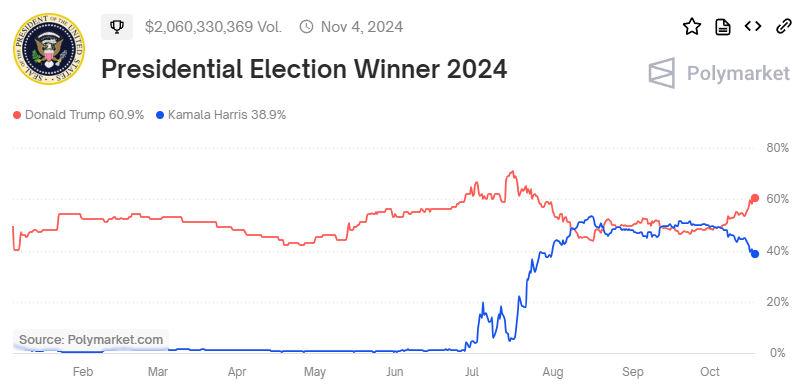Amidst the ongoing U.S. presidential elections, a crypto app was able to capture the prediction market: Polymarket. The protocol allows users to bet on the outcome of elections, competitions, or general events. How did Polymarket break into the mainstream?
Prediction markets are exchange-based platforms where participants trade contracts based on the outcome of future events, such as elections or economic trends. The prices of these contracts reflect the collective probability of an event occurring. Traders benefit directly when their predictions align with the actual outcome. This simple concept gains particular relevance during the U.S. election cycles every four years, as highlighted by the rapid rise of the betting platform Polymarket.
Over 2.5 Billion USD in Trading Volume for U.S. Elections
Trading markets for future events have long existed in the traditional world. However, Polymarket aimed to bring this business to the blockchain. The decentralized protocol launched in 2020 on the Polygon network—hence the name Polymarket. The founders' promise: greater transparency, lower fees, and resistance to censorship. But it took four years for the app to break into the mainstream. The controversial events surrounding the current US presidential election revealed the perfect product-market fit.
The platform allows users to bet on who will be the next US president, who will win the popular vote and which party will control both houses of Congress. Traditional betting exchanges have additional hurdles to overcome. Polymarket makes it easy to trade using cryptocurrencies or credit card deposits.

To date, users have placed more than USD 2.5 billion on various outcomes of the US elections. Of this volume, 2 billion was bet on the race between Kamala Harris and Donald Trump. Thanks to these impressive numbers, mainstream media outlets like Bloomberg now use the crypto app as a primary indicator of election probabilities.
Can Polymarket Maintain the Hype?
Yet Polymarket also has its critics. Prediction markets operate in a regulatory gray zone. Authorities may classify betting on real-world events as gambling, depending on their legal interpretation. Polymarket would not meet the stringent requirements of the gambling industry; users do not even undergo an identification process. As a result, in a settlement with the Commodity Futures Trading Commission (CFTC) in 2022, the platform had to pay a fine of 1.4 million USD to the CFTC. Polymarket claims to have built an "exceptional compliance team and robust internal practices" as a result of the investigation.
Observers also criticize the strong focus on volume rather than "open interest." Open interest refers to the total value of active, unsettled contracts in a prediction market. Volume can easily be inflated due to low fees, while open interest provides a clearer picture of how much money is at stake. This value cannot be determined directly via the platform. However, according to on-chain data, the total value wagered on Polymarket is around 211 million USD. This value was around 20 million before the parabolic increase due to the elections.
Total value locked on the Polymarket prediction platform / Source: DeFi Llama
It remains to be seen how much of this activity will persist after the U.S. elections. Competitor Augur lost nearly 80% of its total value locked (TVL) after the 2020 presidential election. Nevertheless, Polymarket has likely introduced a significant number of new users to the crypto space. Currently, nearly 100,000 individual wallet addresses trade on the platform each month, many of whom may not even realise that blockchain technology is powering their bets in the background.








